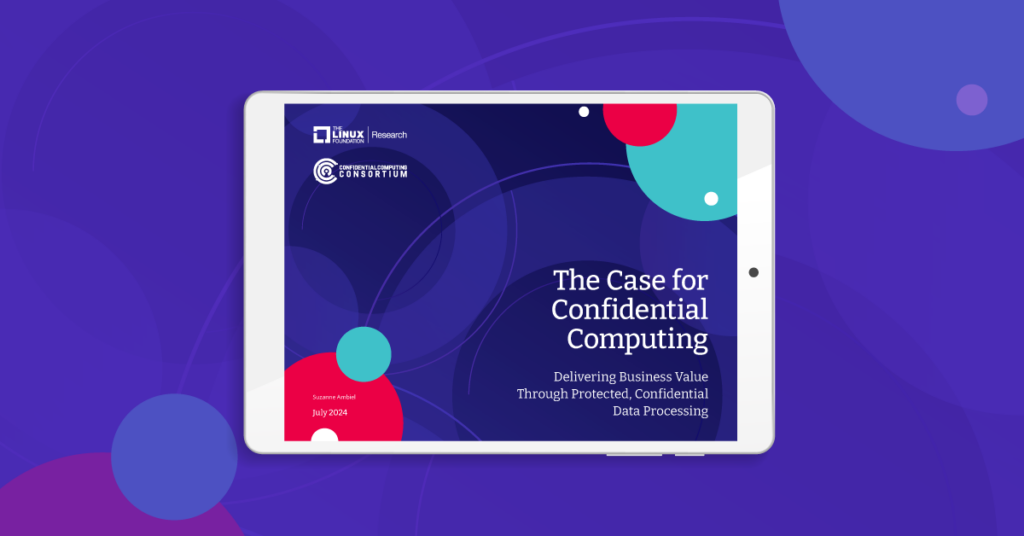
Discover how Confidential Computing can revolutionize data security, compliance, and innovation by reading The Case for Confidential Computing by Suzanne Ambiel. This report offers valuable insights for business leaders looking to leverage this emerging technology to secure data in use and unlock new opportunities.
Who should read this report?
The target audience includes business leaders, IT professionals, and decision-makers across various industries. Specifically, it is aimed at CIOs, CTOs, CISOs, and data protection officers who are responsible for safeguarding sensitive data and ensuring compliance with data privacy regulations.
Anyone else?
Additionally, the report is relevant to healthcare providers, financial institutions, and marketing strategists seeking innovative solutions to securely process and collaborate on data. It also addresses technology vendors, cloud service providers, and enterprise architects interested in the latest advancements in secure data processing and trusted execution environments.
Why is Confidential Computing important?
The protection and confidential processing of data are crucial for maintaining competitive advantage, regulatory compliance, and customer trust. The report offers comprehensive insights into how businesses across various industries can leverage Confidential Computing to secure data in use. This technology not only enhances data privacy and security but also unlocks new opportunities for cloud computing, multiparty data collaboration, and innovation. With the insights achieved from this report, business leaders will gain a clear understanding of how Confidential Computing can address the pressing challenges of data security, especially in the context of AI, cloud computing, and multiparty data collaboration.
Transformative benefits shown through real world examples
The report dives deep into industry-specific use cases, illustrating how Confidential Computing can transform operations in sectors like healthcare, financial services, and marketing. For instance, it explains how Confidential Computing enables secure data aggregation in healthcare, leading to better patient outcomes and more efficient research processes.
By exploring these use cases, readers will see how implementing Confidential Computing can lead to significant business benefits, including enhanced data security, compliance with global regulations, and improved operational efficiency. The report is a valuable resource for any organization looking to harness the full potential of its data while safeguarding it against modern cyber threats.
A surprising reward
One of the most surprising findings from the report relates to how financial institutions are leveraging Confidential Computing to combat money laundering. By securely pooling transaction data from multiple institutions in a Confidential Computing environment, these organizations can detect suspicious activities more effectively and comply with stringent anti-money laundering regulations. This collaboration not only enhances fraud detection and reduces compliance costs but also accelerates innovation in financial crime prevention, illustrating the transformative potential of Confidential Computing in the financial sector.
Go deeper with practical next steps
The report offers detailed insights into how Confidential Computing can enable secure multiparty data collaboration, which is crucial for industries like healthcare and financial services that deal with highly sensitive data. By understanding these mechanisms, organizations can better protect their data while leveraging collaborative opportunities. It provides actionable recommendations for improving data security practices, including the implementation of trusted execution environments (TEEs) and secure enclaves. These practical steps can help organizations enhance their overall cybersecurity posture and ensure compliance with global data protection regulations. The report includes industry-specific use cases that demonstrate the tangible benefits of Confidential Computing in various sectors. Readers can learn how leading organizations are successfully using this technology to innovate, improve operational efficiency, and gain a competitive edge while maintaining stringent security standards.
Take it from the experts
The primary research for “The Case for Confidential Computing” involved comprehensive interviews with key industry experts from leading organizations such as TikTok, Google, Hushmesh, Intel, Decentriq, RedHat, and the Confidential Computing Consortium. Participants included Vini Jaiswal, Mingshen Sun, and Dayeol Lee from TikTok; Manu Fontaine from Hushmesh; Marcus Hartwig from Google; Malini Bhandaru, Mike Ferron-Jones, Mona Vij, and Paul O’Neill from Intel; Nikolas Molyndris and Andrew Knox from Decentriq; and Mike Bursell from the Confidential Computing Consortium. These experts provided insights into the practical applications, benefits, and challenges of Confidential Computing across various sectors, highlighting the technology’s potential to enhance data security, facilitate compliance, and drive innovation.
Revolutionizing Data Security with Confidential Computing
Confidential Computing offers transformative benefits across multiple sectors by providing a secure, hardware-based environment that protects data in use. This technology enables efficient marketing by enriching first-party data, supports the adoption of AI by safeguarding proprietary models, and enhances financial security through secure data pooling. It also fosters collaboration in healthcare, allowing for better patient outcomes and accelerated medical research This approach could revolutionize data security, making it an inherent feature of the infrastructure, thus automating and securing the entire digital ecosystem.
Learn more about these important concepts and how your business can benefit by diving in to The Case for Confidential Computing by Suzanne Ambiel.


-1.png?width=1140&upscale=true&name=CCSummiit%20CCC%20Kit%20Twitter%20(1)-1.png)